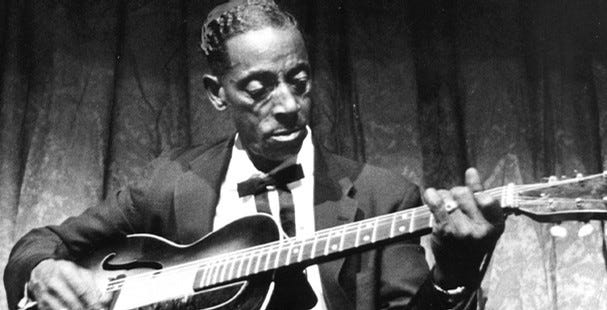Your sure enough girl is dead.

Lord I got a letter from Hot Springs, I’ll tell you how it was read. You best come at once, boy. Your sure ‘nough girl is dead.
That’s what Mississippi Fred McDowell sang in his 1959 “Letter from Hot Springs.” He was singing about the little town of Hot Springs, Arkansas, a twenty-something thousand person town in a valley between three foothills of the Ozark Mountains. This small southern town has had some measure of notoriety over the years. It's the smallest U.S. National Park. It was the place where future President of the United States Bill Clinton grew up. It was once the home of spring training for most of Major League Baseball. In 1959 when Fred McDowell wrote his dark and brooding tune, Hot Springs was also home to what Bobby Kennedy called “the largest illegal gambling operation in the United States.”
As far back as Reconstruction, Hot Springs had been home to wide-open illegal gambling. By 1959 there were no fewer than eight full-scale brick-and-mortar casinos in operation in violation of state and federal laws directly across the street from the U.S. Government’s National Park Bathhouse Row. The same year Fred McDowell wrote “Letter from Hot Springs,” a former moonshiner named Dane Harris opened the doors on what would become the crown jewel of the Arkansas carpet joints. He aimed for his club to be the most upscale, swanky, high-rolling-est joint in town - a place on par with anything in Vegas or New York. He would call his palace The Vapors, named for the steam that rose each morning from the mountains behind the club and across the valley. It opened to much fanfare and attracted entertainers and clientele from all over the world. Less than five years after it opened, The Vapors was blown to bits.
The bombing of The Vapors was never solved, though it’s possible it had something to do with an internecine mob conflict that stretched from Chicago to New Orleans to Las Vegas and involved one of Harris’s silent partners, a British mobster from New York named Owney Madden. Madden was once the leader of the notorious Five Points gang The Gophers, the murderer of no fewer than six men, an associate of Charles “Lucky” Luciano and Meyer Lansky, the manager of prizefighters like Primo Carnera, and owner of the famed Cotton Club. After murdering the gangster Vincent “Mad Dog” Coll, Madden was told to hide out in Hot Springs. He ended up living there for the next thirty six years of his life and became the underworld ambassador of the city’s illicit economy.
But most interesting to me, anyway, is that The Vapors employed a young woman named Hazel Hill. A widow with three sons who lived mostly in abject poverty and was hopelessly adrift, Hazel got by with a combination of drugs, alcohol, married wealthy benefactors and the benevolence of Hot Springs casino owners like Dane Harris who offered her gainful employment when all of the above failed. Hers was a life of poverty, crime and violence. Somehow she survived it all. Even more incredibly was that her young sons survived it, including her youngest, who fared for himself in the streets of this wild Southern town from a very young age, and who it is probably no surprise at this point to reveal was my father.
This is the story that I am here in Hot Springs to write, the story of The Vapors and these three lives that intersect within its walls. This is why I've moved my family across the country to live here in this gigantic one hundred plus year old Victorian house on top of a hill. This is why my wife, saint that she is, is struggling so hard to make the most of a new life in a strange place - in a big scary house with an attic full of bats and every kind of bug you can imagine in every other room. It has rained almost every day that we have been in Hot Springs so far. The raccoons have tumped over our garbage cans and today while we sat on the porch in rocking chairs reading and listening to the rain one of the raccoons walked right up to us like he owned the place. At night there is no noise but the cicadas, which is a racket louder than a whole armada of NYC sanitation trucks or East Indian Day parades. And when it isn't raining, it is a soggy hundred degrees.
Still, I love Hot Springs with all my heart. It is more than just sentiment, too. True, this is where I was born and raised. But much has changed in the twenty years since I last lived here, and much of that change has been for the better. Yes, it warms my heart that both of my children are attending schools that I myself once attended, playing on jungle gyms I may have climbed on, walking halls I once ambled down myself. But it also is so pleasing to me to see just how far this city has come since I lived here, all the kinetic energy pulsing around it, much of which I will tell you about in later letters. The point is, it will eventually stop raining, the bats will eventually eat all of the cicadas, the raccoons will come to understand that I have a broom and I'm not afraid to use it, and this strange house will one day come to feel like a home. The bugs, I'm afraid, are here to stay. This is Arkansas, after all.
The Hills of New York City are here now. The ghosts of the Hills of Hot Springs are all around us. At some point this year we're going to all sit down together and write this goddamn book.
Until next time,
David


